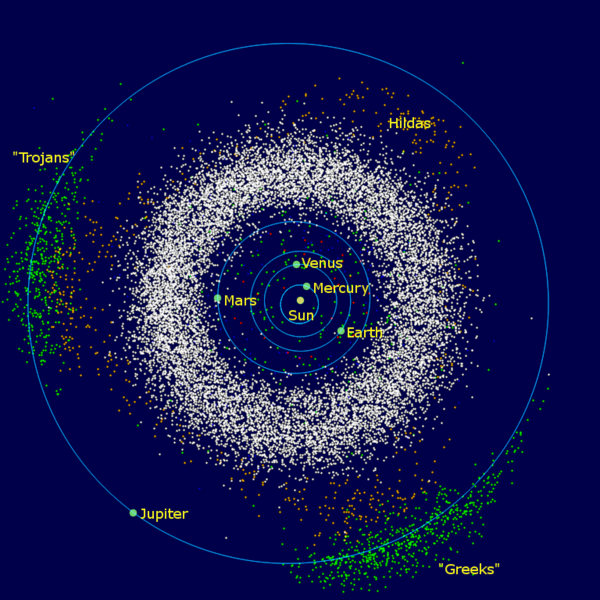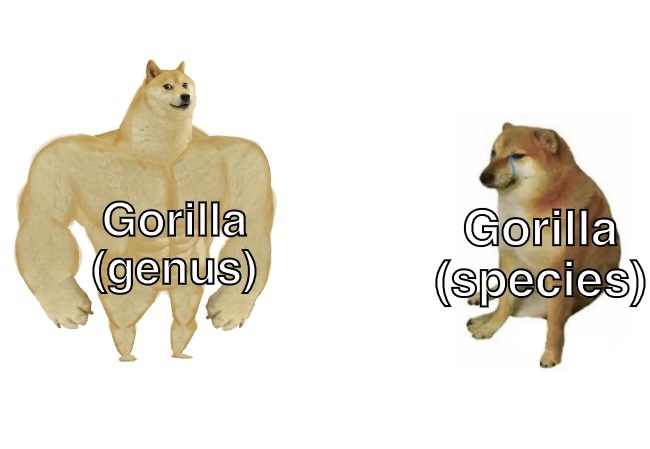Pluto will always be a planet to me, and you’ll pry that definition from my cold, dead hands!
Stay strong. A dwarf planet is a perfectly valid kind of planet, don’t let anyone tell you otherwise.
It’s not the size that counts but the ability to clear your orbit. ;)
So tell me about Jupiter
Good question! I had forgotten about Jupiter’s Trojans and Greek asteroids!

I went and checked the definiton of Clearing the Neighborhood by IAU, emphasis mine:
The phrase refers to an orbiting body (a planet or protoplanet) “sweeping out” its orbital region over time, by gravitationally interacting with smaller bodies nearby. Over many orbital cycles, a large body will tend to cause small bodies either to accrete with it, or to be disturbed to another orbit, or to be captured either as a satellite or into a resonant orbit. As a consequence it does not then share its orbital region with other bodies of significant size, except for its own satellites, or other bodies governed by its own gravitational influence. This latter restriction excludes objects whose orbits may cross but that will never collide with each other due to orbital resonance, such as Jupiter and its trojans, Earth and 3753 Cruithne, or Neptune and the plutinos.[3] As to the extent of orbit clearing required, Jean-Luc Margot emphasises “a planet can never completely clear its orbital zone, because gravitational and radiative forces continually perturb the orbits of asteroids and comets into planet-crossing orbits” and states that the IAU did not intend the impossible standard of impeccable orbit clearing.[2]
Trojans and Greeks orbit Jupiter’s LaGrange points in a stable orbit and so they are governed by Jupiter’s gravity. You could say they’re really weird moons orbiting semi-stable points Jupiter creates.
So since there are like 95 moons (as of last Feb) of jupiter, I’m calling out a dwarf planet
this condition makes “planetness” into a local condition. so theoretically, we can throw enough junk into space and stop anything we want from being a planet.
pluto just got unlucky in terms of the amount of trash it has in its way. its not fair :(
No, because if it’s a proper planet it will clear its orbit.
Bad astronomy and fake news below please ignore me.
also Pluto lovers should note that orbital dominance takes longer the farther out you are, due to the size of the orbit itself and the sheer amount of time it takes to make a trip around, limiting interactions with neighbors.Pluto will eventually own it’s orbit and whatever species has inherited the earth by then may decide to grant it full planet status again!and whatever species has inherited the earth by then
Well, only if we move the Earth safely outwards of the huge Sun.
You made me curious about the timeframe and it turns out I had it completely wrong.
Pluto’s lack of orbital dominance is a matter of size not time, it’s already had the required time it’s just too wee to get it done. Pluto will never be a full planet!
By the time the Plutians invade they can have Earth
Does it dig mines and sing upbeat work songs?
ROCK AND STONE……… and orbits
I am a dwarf and I can’t clear orbits, can’t clear orbits, can’t clear orbits
without orbital dominance?
amazon.com ass planet with fake reviews.
So Neptune has a rogue rock in its orbit that also orbits the sun and we’re just gonna give Neptune a pass on that one because we saw it first.
At best, this is size discrimination, and neptunotism, and we both know it!
Look, just be careful that you don’t confuse proplutoism with antineptunotism.
Yeah but it’s delivered with a nice hand written note from a single mom in China so I 5 star anyways.
Upvoted for funny doos ex name
The central point that Pluto and Charon orbit about is also outside of Pluto. All other planets have the center point located within the planet.
https://en.wikipedia.org/wiki/File:Pluto-Charon_system-new.gif
Then that makes it the solar system’s first discovered Binary planets
Arenyou gonna start calling Ceres, Haumea, Makemake, and Orcus planets?
We went through this 150 years ago ehen the asteroid belt was discovered. Every astronomer wanted credit for discovering a new planet, so at one point there were 15 before all the astronomers got together and said it was untenable.
Yes. We could have had a planet Orcus and we were like “nah, we’ll pass.” That would have been metal as shit.
Real scientific, Jerry.
Hungry For Apples?
Whatever, Pluto is a dwarf planet like every other dwarf planet too.
A dwarf planet is a type of planet, right?
:'(
New Billy Joel song? I heard he’s writing again.
You know, this post made me realize something. Some people are viewing it in terms of “rank”, instead of an arbitrary scientific classification designed to efficiently communicate ideas in a clear and concise way.
It’s like … mythology or something, and the planet(oid) being anthropomorphized.
Do people also view kingdom, phylum, class, order, family, genus, species as “ranks” of some sort, with some intrinsically greater value being given to some over others?
It’s like … mythology or something, and the planet(oid) being anthropomorphized.
I mean, the planet(oid)s are named after gods.
The personification of its classification is probably related to the exclusivity of the title and “bigger is better” mentality. Since every life form has a taxonomy for domain to species, there’s not really an exclusivity to each echelon. I don’t imagine anybody really thinks like this meme below, for example:

This makes me want to devise a tiered, inclusive classification scheme for space objects.
We could start with orbital objects, any object that normally experiences regular, periodic orbits with minimal deviation. So, everything in the galaxy would be one except potentially Sag A, and the galaxy itself. Perhaps the next branching subsets could be things undergoing continuous fusion somewhere in their body or not?
Do people also view kingdom, phylum, class, order, family, genus, species as “ranks” of some sort, with some intrinsically greater value being given to some over others?
Well, for humans we most certainly do
So, “homo” is better than “sapiens”? And “animal” is better than homo sapiens?
Or do I have it backwards, and “lower” ranks are better? So, “pinus ponderosa” would be better than “plant”?
I was just alluding to our racism 👀
Our racism is completely unrelated to our classification. We are racist between homo sapiens and homo sapiens
I think it’ll matter a bit more once (if) we get to explore our solar system for real. I feel like right now the concept of “planet” is still rather distant in our minds and a lot of people just base it on vibes
Hard not to anthropomorphize things when they’re named after our gods
Thing is everyone has one of those.
Compare it to non-sentience, sentience, and sapience, to properly anthropomorphize it.
Every celestial body fits into a specific classification too.
Yeah but no one just has a kingdom or phylum.
Every living creature gets an entry from domain to species.
Celestial bodies aren’t a hierarchy, a planet isn’t also a dwarf planet or an asteroid.
Planet Y
In case it’s a dwarf
Planet x
Damnit who let Elon name that planet?
When ever Eris isn’t on screen everyone should be asking “Where’s Eris?”
“Where is Eris? Is it safe? Is it all right?”
“It appears that, in your anger… You classified it as a dwarf planet.”
“NOOOOOOOOOOOOOOOO!”
Hmmm… Lost a planet Obi-Wan has. How embarrassing.
Our Ceres is perfectly legal
Note: Eris died on the way back to his home minor planet.
The planet formerly known as twitter.
Alright, if I ever talk about this planet this is what I’m calling it from now on.
aint no planet x coming cause aint no space cuz aint not globe earth
aint no birds flying cause aint no worms cuz aint not soil earth
deleted by creator
Cease your investigation!
Imagine how poor Pluto would feel if we decided this new entry counted as a proper planet.
Nah, man. Pluto doesn’t care any more. Even as a dwarf planet, he knows he’s still hot shit
Pluto is the celestial body your Wife tells you not to worry about because “Oh, don’t worry it’s just Pluto coming over when you are out of town, and Pluto isn’t a planet so there is nothing for you to get anxious or jealous about”.
It’d have to be exceptionally large to clear its orbital path at that distance from the sun. It’ll probably join Pluto in the dwarf planet category.
He should pull himself up by his bootstraps and get his Alpha Planet grindset on. No one can be a proper planet with this Sigma Planet mindset
Is planet X really discovered?
They found more evidence for its existence recently, but no. Nobody has ever seen it or even found out in which direction to look. The evidence is that the other planets move in ways that only makes sense if there is some mass somewhere pulling their orbits.
Sort of like having to discover the moon from watching the tides in the sea.
this method is how we discovered Neptune and Pluto and many exoplanets. Kepler’s laws are extremely specific about orbits, so once you pin down the disturbances the planet makes you significantly narrow down the places it can be.
Yes, but that new evidence is way less distinguishable from noise than the one for Neptune.
At this point, the most likely is that there isn’t anything there.
Can we just send someone to check it out? Stop being lazy.
I have a pizza for I. C. Weiner
Yes, the difference being that the existence of Neptune and Pluto could be visually confirmed through telescope more easily. They’re also not visible to the naked eye, but they can be found in telescopic images by comparing to a map of the sky at other times. Later on they were visited by probes.
I don’t know what counts as a discovery of a planet. Personally, I’d like to see any kind of real data from the planet before claiming it discovered.
The calculations can be 100% correct, but they’re not verified until there’s some kind of external proof.
The planet X (or 9 or whatever) has yet to be seen in any kind of way.
So far the calculations have been confirmed by other calculations showing the same thing, and they’re most certainly correct, but the “solid” proof is still missing.
(It doesn’t have to be solid or visual, I don’t know the English word for it; it just needs to originate from the actual existence of the planet and not only from the effects of its theoretical existence.)
Thought there were some significant progress…
Well we figured out where to look for it, and it is definitely the sky. We tried looking the last place we left it, and then we looked all around the basement from top to bottom. Yup, we can say with confidence folks, Planet X is hiding somewhere above us.
Yeah well, not really. Next year maybe, according to the article linked yesterday.
Have they tried looking up towards the sky? I think they won’t find it underground.
I saw it named planet 9
Named so here https://en.m.wikipedia.org/wiki/Planet_Nine
Ceresand Eris didn’t even get turns being planetsCeres was considered a planet in the first half of the 1800’s, along with a bunch of things in the asteroid belt. There was a point where there were 64 planets.
In the present state of knowledge astronomers give us the following list:
Sixty-four “primary planets” revolving round the Sun as our Earth does.
Twenty satellites, including our Moon.
Of the sixty-four primary planets fifty-six are asteroids, comparatively small bodies, all of which were discovered in this century, and fifty-two since the year 1844.]
Finally, all that yoyo polish!
I believe there was a mathematical constant to find the space ( km/ lightyaers from the sun ) where a planet should be. Do’nt remember the name tho. Is pluto on the next ‘free space’ ?














